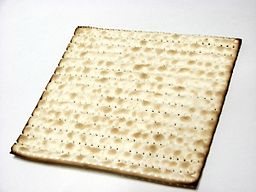by Susan Weinberg
With Passover fast approaching, it was time to revisit the wise child and what exactly makes him wise. Rabbi Davis began the discussion by asking the group about Passover traditions in addressing this topic. One person noted her family looked at it from a generational perspective, from religious to not knowing what to ask. It was also proposed that one person could embody all four children.
The language in the handout (The Wise Child) raised yet another question. While the wicked child asks "What does this drudgery mean to you?", distancing himself from the community, the wise child asks about the "precepts, statutes and laws God commanded you" also distancing. The rabbi noted that the language in Deuteronomy says "commanded me" and the Torah which was ultimately quoted uses the phrase "commanded you".
So what makes the wise child wise? He asks a question and wants to listen to the answer. He is paying attention, having observed what has occurred up to that point. His question is God based -"what has our God commanded you".
We shifted our attention to the afikomen, a Greek word that means dessert. In the Passover seder a portion of it is hidden for children to find. It was suggested that metaphorically it represents what is hidden and if a child seeks what is hidden he will find the secrets. The seder was modeled after the Greek or Roman symposium which began with discussion and led to partying. It actually means music, dessert and party hopping.
But we have a puzzling admonition. "It is forbidden to conclude the afikomen after the Passover offering". Kedushat Levi offers this interpretation: In fact the afikomen is viewed as a symbol of something new representing renewal and resuming the eating of "chametz" is to return to something old. We are to retain the taste of matzo all year lest we lose the taste of renewal. Netivot Shalom added to this interpretation by noting that we are to look to the moon for "she teaches about innovation/change and renewal".
With this introduction, the rabbi posed the question of the relationship of art to renewal. Every canvas is a clean slate, a chance to start fresh was offered. Each person who views our artistic work has a new way of seeing it. It was noted that some artists such as Chuck Close are process artists concerned with how to accomplish the same thing in different ways. The focus is on process, not the end result. Yet another suggested the painting Dance by Matisse which leaves a gap in the circle, hands not quite meeting to indicated a continuous evolving process. It was suggested that renewal is reflected not only in what comes out, but what comes in to renew us as artists.
The second part of our session was led by Alison Morse and Diane Pecoraro who began the session by reading one of their poems on the themes of process and wisdom. The session was geared to us getting a better sense of each other's work. To this end they shared a handout (Artist Philosophy) with a selection of artists and their comments about their work, all of which made quite interesting reading. In small groups, our task was to prepare questions we would ask a specific artist if we were to interview them. We then used these questions to interview our fellow artists. For example Lee Krasner noted "I never violate an inner rhythm, I loathe to force anything". Were I to interview her, I would have asked "What allows you to find your inner rhythm? Do you go through periods where you can't find it? How do you respond to that?"
We then gathered the full group and posed some of the questions to the larger group. The exercise was both thought-provoking and well received.
Image source


No comments:
Post a Comment